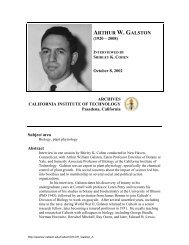Interview with David Baltimore - Caltech Oral Histories
Interview with David Baltimore - Caltech Oral Histories
Interview with David Baltimore - Caltech Oral Histories
You also want an ePaper? Increase the reach of your titles
YUMPU automatically turns print PDFs into web optimized ePapers that Google loves.
<strong>Baltimore</strong>-102<br />
BALTIMORE: I had no idea what was going on. And what’s more, when you look at the details<br />
of it, it didn’t matter. It wasn’t about important issues he was doing this. It was about<br />
unimportant issues—a control here... [Pause] You know, saying it that way may actually<br />
explain what was going on, which is that when he had to do things that were unimportant, he<br />
would cut corners. When he did things that were important, he didn’t cut corners—as far as<br />
anybody knows, and he’s not been accused of it. And what happened at MIT was that he started<br />
cutting corners about things that were important.<br />
LIPPINCOTT: And some of his colleagues noticed it.<br />
BALTIMORE: People in the lab noticed it. He was claiming things that had never been done, and<br />
they knew that they had never been done; and so they blew the whistle on him.<br />
LIPPINCOTT: Well, that’s a terrible shame.<br />
BALTIMORE: Yes, it is a terrible shame.<br />
LIPPINCOTT: Tragic. What happened to him Is he out of science<br />
BALTIMORE: He’s out of science—he’s been working in the investment area. As I say, he’s<br />
very smart. But from my point of view, it was an unfortunate but hardly serious issue.<br />
LIPPINCOTT: But you asked that his work be investigated after it came out in the news.<br />
BALTIMORE: Oh, right, absolutely. I mean, I had to. It had nothing to do <strong>with</strong> the news. As<br />
soon as I heard from MIT that they had strong reason to believe that he had— I was called by<br />
somebody I knew there, and he told me—he couldn’t tell me the details of it, but he said there is<br />
no question that he [Van Parijs] was faking data on a significant scale. So I wanted to know if<br />
we had a problem, and I looked over the work we’d done here. But, interestingly, one of the<br />
people who is still in my lab worked very closely <strong>with</strong> him, and she said, “I never saw anything<br />
to suggest it—anything of this sort.” And she actually created a lot of the figures in the papers<br />
that we published <strong>with</strong> his name.

















